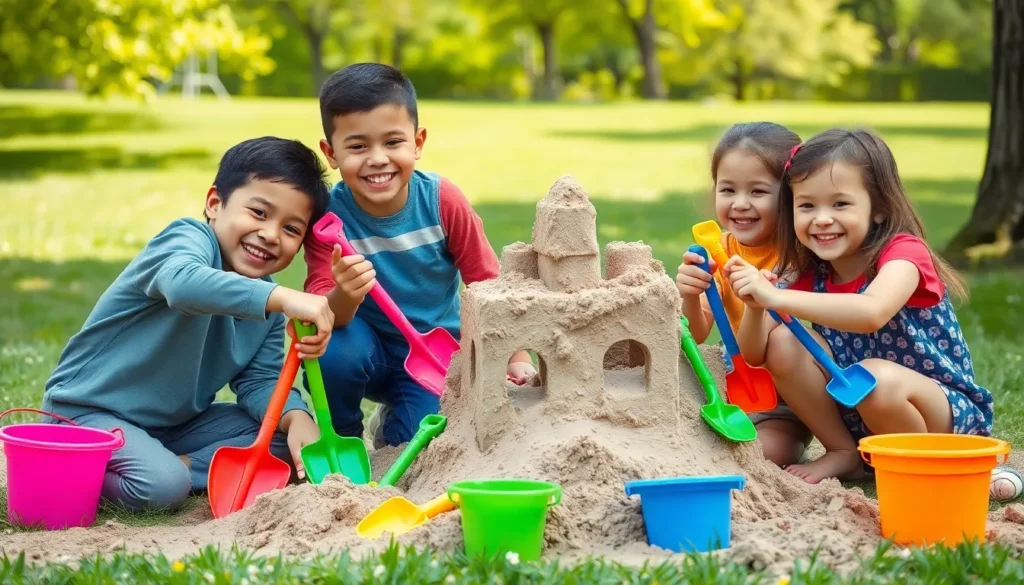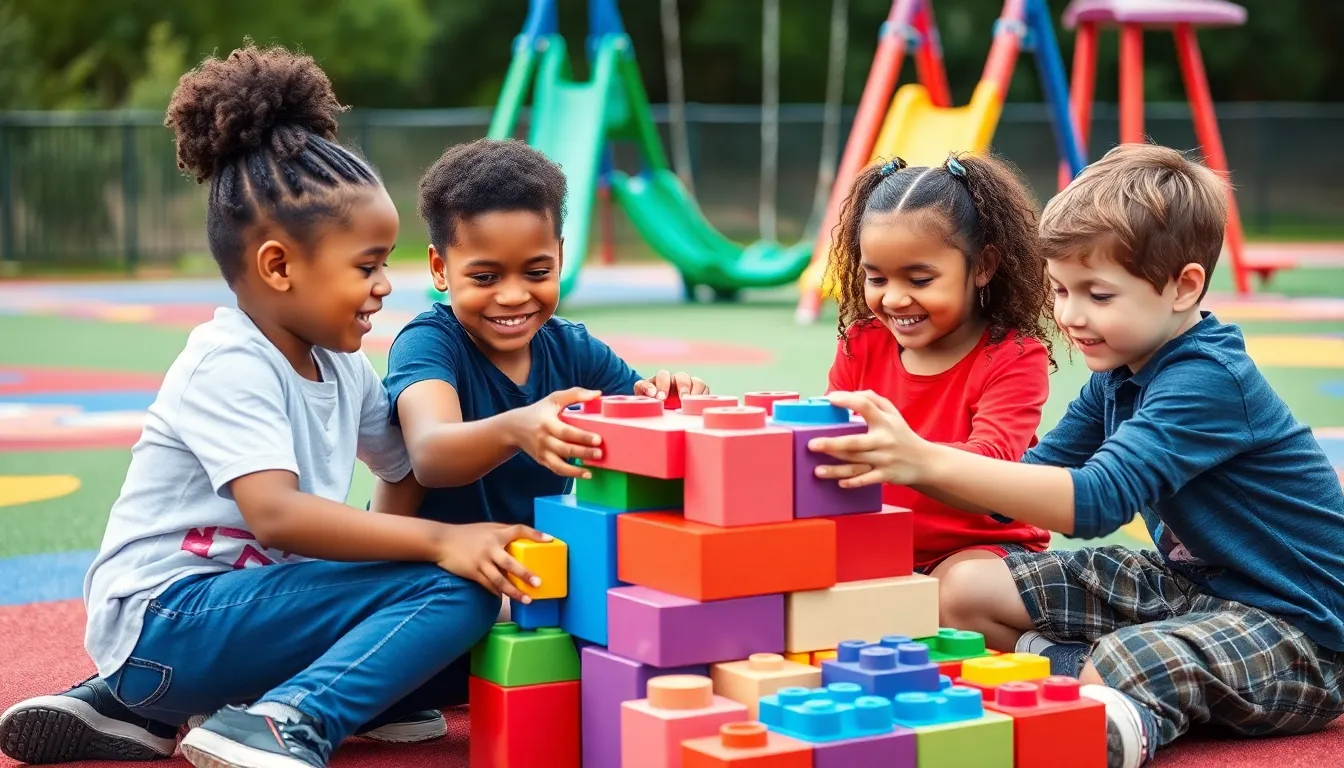Table of Contents
ToggleIn a world where solo play can feel like a one-man band playing out of tune, cooperative play development emerges as the ultimate jam session. It’s not just about sharing toys; it’s about building connections, fostering teamwork, and unleashing creativity in ways that solo play simply can’t match. Imagine kids collaborating to build the tallest block tower or strategizing their next big adventure in a game of make-believe. That’s the magic of cooperative play.
Research shows that engaging in cooperative play not only enhances social skills but also boosts cognitive development. It’s like a secret recipe for success, where teamwork makes the dream work. So why not dive into the world of cooperative play? Whether you’re a parent, educator, or just a curious adult, understanding its benefits can transform playtime from mundane to extraordinary. Get ready to explore how cooperative play can turn little ones into big thinkers and lifelong friends.
Understanding Cooperative Play Development
Cooperative play is crucial in children’s development as it nurtures social interactions and communication skills. Understanding its nuances can help caregivers foster enriching play experiences.
Definition of Cooperative Play
Cooperative play involves children engaging in shared activities with peers, promoting teamwork and problem-solving. During this play, children coordinate actions, negotiate roles, and achieve common goals. They learn to respect one another’s perspectives while developing empathy. This form of play contrasts with solitary play, where individual exploration occurs without peer interaction. By practicing cooperative play, children enhance their social skills, which are essential for later interactions in school and beyond.
Stages of Cooperative Play
Cooperative play consists of various stages that highlight developmental growth. In the first stage, parallel play, children play side by side without direct interaction. This stage evolves into associative play, where interactions become more prevalent—children start sharing materials and ideas while maintaining individual goals. The most advanced stage is cooperative play, characterized by organized activity and a shared purpose. During this stage, children collaborate completely, working towards shared objectives. Engaging with peers in these stages fosters critical cognitive and social skills necessary for long-term development.
Importance of Cooperative Play
Cooperative play enhances children’s overall development by fostering key skills and emotional intelligence. Engaging in shared activities promotes interaction among peers, resulting in significant growth.
Social Skills Development
Social skills flourish during cooperative play. Children learn to communicate their ideas effectively. Listening to others becomes a natural habit, improving negotiation skills. Teamwork also transforms solitary play into collaborative experiences. They gain insight into conflict resolution through interactions with peers. Encouraging cooperation helps children develop empathy, as they consider other perspectives. Enhanced social abilities translate into stronger friendships and effective communication skills in various settings.
Emotional Growth
Emotional growth stems from engaging in cooperative play. As children work together, they experience shared joy in successes. Facing challenges together fosters resilience and adaptability. They learn to manage frustration when things don’t go as planned. Understanding emotions becomes easier as they observe their peers’ reactions. Through play, children develop a sense of belonging, which boosts self-esteem. Supportive interactions during cooperative play nurture strong emotional bonds and improve overall mental wellness.
Strategies to Encourage Cooperative Play
Encouraging cooperative play involves implementing effective strategies that promote teamwork and social interaction among children.
Structured Group Activities
Structured group activities provide a framework for children to engage in cooperative play. These activities often involve specific roles, tasks, or goals that encourage collaboration. Examples include team sports, group art projects, and problem-solving challenges. Such activities foster communication, requiring children to express their thoughts and listen to others. Educators and parents can facilitate these experiences by creating an inclusive environment where every child’s input is valued, promoting a sense of belonging and teamwork. In structured settings, children learn to negotiate, share responsibilities, and take turns, essential skills that enhance their social development.
Free Play Opportunities
Free play opportunities allow children the freedom to explore and interact organically. Unstructured play facilitates natural cooperation, as children must navigate their social dynamics without adult intervention. Playgrounds, outdoor spaces, or open-ended play sessions can stimulate imaginative play, giving kids the chance to form alliances and collaborate on shared projects. During free play, children develop problem-solving skills and learn to communicate effectively as they create rules and negotiate their play scenarios. This type of interaction not only boosts creativity but strengthens friendships, making free play a critical aspect of cooperative play development.
Role of Educators and Parents
Educators and parents play a vital role in fostering cooperative play among children. Their involvement enhances children’s social and emotional development through structured activities and guided interactions.
Facilitating Cooperative Play
Facilitating cooperative play requires intentional approaches in both structured and unstructured settings. Educators can create team-building exercises or group projects that encourage collaboration and communication. Parents might organize playdates that allow children to interact in varied environments. Kids thrive when provided with diverse activities that encourage sharing and teamwork. Role-playing games also offer opportunities for creativity while reinforcing group dynamics. These interactions help children develop critical social skills like empathy and problem-solving.
Observing and Assessing Play Dynamics
Observing play dynamics is essential for adults supporting cooperative play. Educators should monitor interactions to identify opportunities for enhancing teamwork. Noticing children’s communication styles can reveal strengths and areas needing improvement. Parents can assess how well their children share resources and resolve disputes. By documenting behavior patterns, adults gain insights into children’s social development progress. Adjustments to group compositions or play activities may improve cooperative experiences. Regular assessments support the ongoing growth necessary for effective teamwork, ensuring children develop meaningful friendships.
The Impact of Technology on Cooperative Play Development
Technology significantly influences cooperative play development among children. Digital platforms often create new opportunities for collaboration and problem-solving. Video games, for instance, enable players to work together toward common goals, fostering teamwork skills.
Virtual environments can mirror real-life interactions, allowing children to practice social skills. Online games promote effective communication, as players must discuss strategies and negotiate roles. Mobile apps also offer interactive experiences that require group participation, enhancing engagement and collective problem-solving.
Moreover, technology allows children from diverse backgrounds to connect and collaborate. They can form friendships beyond geographical limits, expanding their social networks. These connections facilitate cultural exchanges, resulting in a broader understanding of perspectives and creative collaboration.
Educational tools, such as coding games and online workshops, encourage cooperative play. These resources emphasize teamwork and creativity, guiding children through challenges that require group input. Children learn to navigate difficulties together, building resilience and developing conflict resolution skills in the process.
On the downside, excessive screen time can hinder face-to-face interactions, impacting traditional cooperative play. Balance between digital and physical play is crucial. Parents and educators must monitor technology use, ensuring children engage in varied play experiences.
To maximize the benefits of technology for cooperative play, adults can incorporate digital activities into structured playdates. They can encourage children to share their gaming experiences with peers and facilitate discussions about collaboration strategies. Promoting a balanced approach allows technology to enhance, rather than replace, essential cooperative play development.
Conclusion
Cooperative play is an essential component of children’s development that nurtures social skills and emotional intelligence. By engaging in shared activities, children learn to communicate effectively and build lasting friendships. The progression through different stages of cooperative play highlights their growth in teamwork and problem-solving abilities.
Parents and educators play a crucial role in facilitating these experiences. By providing opportunities for both structured activities and free play, they can help children navigate social dynamics and develop resilience.
Balancing traditional play with digital interactions can further enhance cooperative skills, ensuring children thrive in various environments. Embracing cooperative play not only enriches playtime but also lays a strong foundation for children’s future relationships and emotional well-being.








